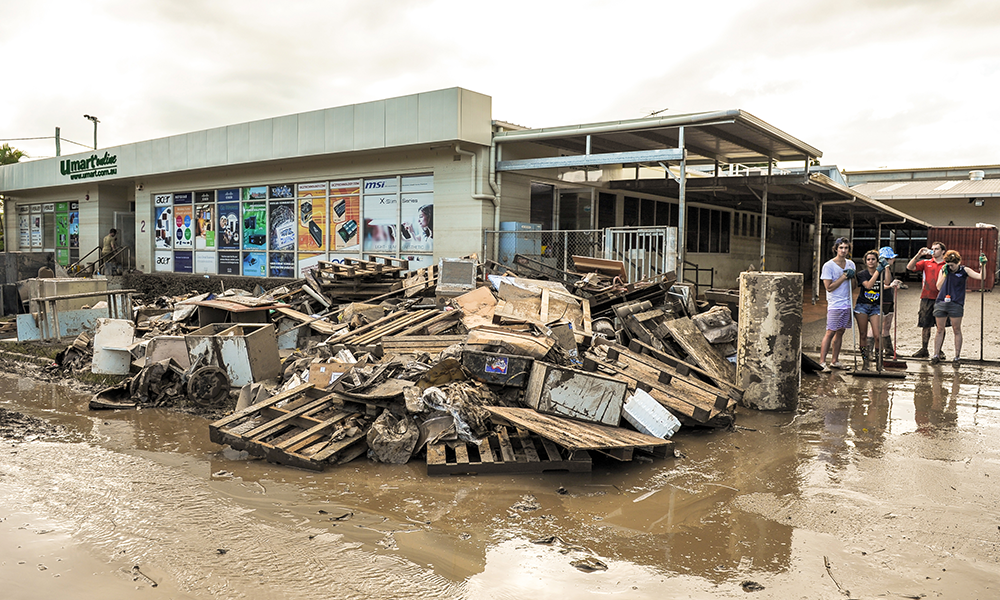Lining up outside a bakery is something I've done before, but in the past it's been for a croissant, not for something as simple as a loaf of white bread so my children could have something to eat that week. Nor have I ever done it at 6am with 60 or more of my neighbours, but this is now the reality in the Northern Rivers. A reality that includes empty supermarket shelves; buying milk, in rationed quantities, from behind the counter at the local fruit shop, and fuel shortages that mean I have to calculate if I have enough fuel to take my son to school and more importantly, if I can get back to pick him up.
I live on the Alstonville plateau, in between Ballina and Lismore, so I am one of the lucky ones. Apart from some fallen trees and a washed away driveway, my family and I are relatively unscathed and there is both gratitude and guilt that comes with that.
People have been talking about the community spirit that this catastrophe has brought out and that is true. It always is in the Northern Rivers. People have also spoken about how let down they feel by all sectors of government and I must admit, everyone affected by this event has every right to feel let down because they were. We were and we continue to be.
I'm not a scientist, but I am the CEO of a firm of economists and I can tell anyone and everyone who will listen that by ignoring climate change, these sorts of events will cost us all dearly.
The last 1 in 100 year flood event was in 2017, now, only five years later and that flood feels minor. If Australian governments continue down the path the current one has chosen, these events will happen again and again. Rivers will keep flooding and houses will continue to be destroyed. Roads will buckle under the pressure of the water. Businesses will not recover and neither will people.
At conservative estimates, there are at least 2000 homes that will need rebuilding. If we take another conservative figure, each home will cost around $400,000 to rebuild and that's not including demolition costs. That figure alone is nearly a billion dollars. That's not a typo. One billion dollars at least. That is not taking into account the roads that need rebuilding, the sewers that need replacing or the electricity and communications infrastructure that was destroyed. It doesn't take into account the equipment lost by businesses and councils.
Nor does it factor in the cost of rebuilding and restocking the schools that will be shut for months, if not years; or restocking and restaffing the health care providers that have literally been washed away. Even something as seemingly innocuous as losing the internet for a week meant that many businesses that didn't suffer physical damage, could still not operate.
The total damage bill may well make the $4 billion emergency response fund look like a drop in the ocean.

Government ministers and members of parliament have been quick to offer thoughts and prayers to our affected communities and while that's nice it offers no solution, no strategy, no hope. The Premier has at least admitted that disaster relief still has not improved since the Black Summer bushfires, despite a parliamentary inquiry and a Royal Commission. So what will it take?
Scientists have been warning us for years, decades in fact, that if carbon emissions aren't drastically cut extreme weather events such as these would become more and more frequent. Just last week the Intergovernmental Panel on Climate Change warned again about the devastating impact on our communities if we don't do more to reduce emissions. In a report out today, the Climate Council said the Brisbane "rain bomb" dropped more water on the city than typically falls in London over an entire year. Society has spent the last two years 'listening to the science' when it comes to how Covid 19 was dealt with so why aren't they 'listening to the science' about climate?
The focus at the moment is rightly on the short term needs of the various devastated communities so what I am about to say may seem trivial but I assure you it is not. As a direct result of governments around the world not having comprehensive climate policies, our climate has warmed by over 1 degree C. Warmer air holds more water, making flooding worse, and this has contributed to making thousands upon thousands of buildings and houses uninhabitable in the Northern Rivers.
If we don't embrace the economic opportunities that reducing carbon emissions provide, then the economic cost of doing nothing will be unbearable. The latest IPCC report was released on the day of the floods so like many, it took me a few days to get around to reading it but it tells us exactly this. We have a limited amount of time to do something to make a difference.
The people of the Northern Rivers are crying out for help on the ground and it is slowly starting to trickle in but what we really need is leadership. We need a commitment to make deep cuts to emissions this decade by whoever wins the next Federal Election - not by 2050 but by 2030. The best time to have done that was maybe twenty years ago, but the next best time to do it is now. The current Federal government tells us regularly that they are the best economic managers we have, yet by not addressing climate change with aggressive action, they are failing at managing our economy.
Written by Jess Price-Purnell, CEO and Director of Strategy at PPM Economics and Strategy and the former Chair of the NSW Young Nationals. She lives in Alstonville on the far north coast of NSW.

